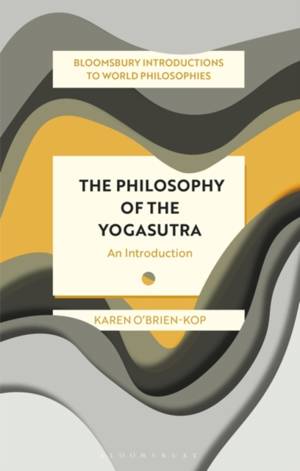
Bedankt voor het vertrouwen het afgelopen jaar! Om jou te bedanken bieden we GRATIS verzending (in België) aan op alles gedurende de hele maand januari.
- Afhalen na 1 uur in een winkel met voorraad
- In januari gratis thuislevering in België
- Ruim aanbod met 7 miljoen producten
Bedankt voor het vertrouwen het afgelopen jaar! Om jou te bedanken bieden we GRATIS verzending (in België) aan op alles gedurende de hele maand januari.
- Afhalen na 1 uur in een winkel met voorraad
- In januari gratis thuislevering in België
- Ruim aanbod met 7 miljoen producten
Zoeken
Omschrijving
Karen O'Brien-Kop's introduction to the Yogasutra highlights its status as a significant work of philosophy. Approaching the Yogasutraas living philosophy, this book elucidates philosophical conceptions of yoga, recognises the logical structure the sutras follow and explains the rules and principles that have sustained Patañjali's system of thought for centuries.
Moving beyond standard interpretations of Patañjali's text and commentary as an aphoristic practice manual, O'Brien-Kop uses branches of philosophy to read the Yogasutra. Covering reality, self, ethics, language and knowledge, Patañjali's philosophies come to the fore. The book introduces his reasoned positions on dual and non-dual metaphysics, the relationship between mind and body, the qualities of consciousness, the nature of freedom, and how to live ethically.
Carefully-selected extracts from the primary text are translated for those unfamiliar with Sanskrit and commentaries run throughout. A glossary provides definitions of key concepts with useful translations. Accessible and up-to-date, this introduction broadens our understanding of Indian philosophical thought and explains why the Yogasutra deserves to be read alongside Parmenides' 'On Nature' and Plato's Phaedoas a classic of world philosophy.
Moving beyond standard interpretations of Patañjali's text and commentary as an aphoristic practice manual, O'Brien-Kop uses branches of philosophy to read the Yogasutra. Covering reality, self, ethics, language and knowledge, Patañjali's philosophies come to the fore. The book introduces his reasoned positions on dual and non-dual metaphysics, the relationship between mind and body, the qualities of consciousness, the nature of freedom, and how to live ethically.
Carefully-selected extracts from the primary text are translated for those unfamiliar with Sanskrit and commentaries run throughout. A glossary provides definitions of key concepts with useful translations. Accessible and up-to-date, this introduction broadens our understanding of Indian philosophical thought and explains why the Yogasutra deserves to be read alongside Parmenides' 'On Nature' and Plato's Phaedoas a classic of world philosophy.
Specificaties
Betrokkenen
- Auteur(s):
- Uitgeverij:
Inhoud
- Aantal bladzijden:
- 200
- Taal:
- Engels
- Reeks:
Eigenschappen
- Productcode (EAN):
- 9781350286153
- Verschijningsdatum:
- 18/05/2023
- Uitvoering:
- Hardcover
- Formaat:
- Genaaid
- Afmetingen:
- 140 mm x 216 mm
- Gewicht:
- 381 g

Alleen bij Standaard Boekhandel
+ 230 punten op je klantenkaart van Standaard Boekhandel
Beoordelingen
We publiceren alleen reviews die voldoen aan de voorwaarden voor reviews. Bekijk onze voorwaarden voor reviews.









